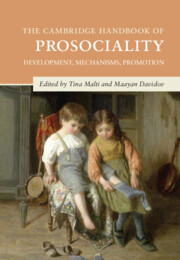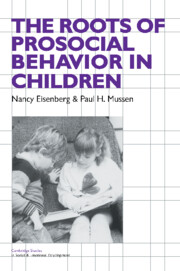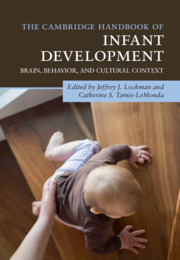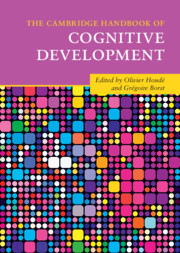The Cambridge Handbook of Prosociality
Development, Mechanisms, Promotion
Part of Cambridge Handbooks in Psychology
- Editors:
- Tina Malti, University of Toronto
- Maayan Davidov, The Hebrew University of Jerusalem
- Date Published: June 2023
- availability: Available
- format: Hardback
- isbn: 9781108834711
Hardback
Other available formats:
eBook
Looking for an inspection copy?
Please email [email protected] to enquire about an inspection copy of this book
-
Prosociality is a multifaceted concept referring to the many ways in which individuals care about and benefit others. Human prosociality is foundational to social harmony, happiness, and peace; it is therefore essential to understand its underpinnings, development, and cultivation. This handbook provides a state-of-the-art, in-depth account of scientific, theoretical, and practical knowledge regarding prosociality and its development. Its thirty chapters, written by international researchers in the field, elucidate key issues, including: the development of prosociality across infancy, childhood, adolescence, and beyond; the biological, cognitive, emotional, and motivational mechanisms that underlie and influence prosociality; how different socialization agents and social contexts can affect children's prosociality; and intervention approaches aimed at cultivating prosociality in children and adolescents. This knowledge can benefit researchers, students, practitioners, and policy makers seeking to nurture socially responsible, caring youth.
Read more- Focuses on developmental processes of change and growth in prosociality across infancy, childhood, and adolescence
- Addresses biological, cognitive, emotional, motivational, and social influences on children's prosociality
- Includes a comprehensive overview of the different socialization agents and how they impact prosocial development
- Summarizes applications to promote prosocial development across contexts, enabling practitioners and policy makers to nurture socially responsible, caring youth
Reviews & endorsements
'Tina Malti and Maayan Davidov's new Cambridge Handbook of Prosociality: Development, Mechanisms, and Promotion is the state of the art for research and scholarship on prosocial development in childhood through adulthood. This is a very impressive collection of top scholars from a wide range of perspectives on prosociality as it emerges and is applied in a wide array of contexts, from the home to schools and the community. Fascinating questions are posed and grappled with, including the role of genetics, the neurobiology of prosociality, how prosociality changes across the lifespan, how it can be challenged in the context of ingroup bias and outgroup distrust, and its connection to moral values and moral cognition. We learn about the role of siblings, parents, schools, and the media for facilitating or suppressing acts of helping, caring, and sharing towards others. This is an indispensable guide for anyone interested in finding out what makes humans prosocial and how we can foster this orientation for a more just and civil society.' Melanie Killen, University of Maryland, USA and Editor of the Handbook of Moral Development
See more reviews'As social animals, humans are born with a healthy dose of empathy and prosociality. It is paramount to know how these tendencies develop in the young and how they can be augmented. For anyone interested in this complex topic, this handbook does an admirable job reviewing current knowledge.' Frans de Waal, author of Mama's Last Hug: Animal Emotions and What They Tell Us about Ourselves
Customer reviews
Not yet reviewed
Be the first to review
Review was not posted due to profanity
×Product details
- Date Published: June 2023
- format: Hardback
- isbn: 9781108834711
- length: 625 pages
- dimensions: 250 x 175 x 42 mm
- weight: 1.31kg
- availability: Available
Table of Contents
Part I. Development of Prosociality:
1. Introduction: what is prosocial development? Definition, history, mechanisms Tina Malti and Maayan Davidov
2. Developmental theories of prosociality Nancy Eisenberg and Tracy L. Spinrad
3. The role of genetics in the development of prosocial behavior Ariel Knafo-Noam and Dana Katsoty
4. Neurobiology of prosociality: investigating the link between empathy and prosocial behavior in the brain Claus Lamm and Paul A. G. Forbes
5. The developmental psychophysiology of prosociality Paul D. Hastings, Ryan T. Hodge and Lindsey C. Partington
6. Early prosociality from a developmental and comparative perspective Felix Warneken and Sarah Probst
7. Prosocial behavior in infancy and early childhood Dale F. Hay
8. Prosociality in middle childhood Richard A. Fabes and Stacy L. Morris
9. Prosocial behaviors in adolescence Gustavo Carlo, Fiorella L. Carlos Chavez and Clara López-Mora
10. Prosocial development across the lifespan Antonio Zuffiano, Emanuele Basili, Stefania Sette, Maria Gerbino, Concetta Pastorelli and Bernadette Paula Luengo Kanacri
Part II. Antecedents and Mechanisms of Prosociality:
11. The motives of prosocial behavior Joscha Kärtner
12. Morality, values, and prosociality across development: intertwined yet distinct Audun Dahl and Marie Grace S. Martinez
13. Emotions and prosociality Ross A. Thompson
14. Social-cognitive development and early prosocial behavior Markus Paulus
15. Temperament and prosocial behavior Deborah J. Laible, Afra E. Agalar, Clare Van Norden and Alysia Cruz
16. Gender and prosocial development Jolien Van der Graaff
17. Assessing prosociality: an early ontogeny perspective Robert Hepach
Part III. Development of Prosociality in Context:
18. Parenting and children's prosociality: multiple pathways to socialization Maayan Davidov and Joan E. Grusec
19. Sibling influences upon prosociality: from infancy to adolescence Claire Hughes and Alison Pike
20. Prosocial behavior, peer relationships, and friendships Kristina L. McDonald, Melanie A. Dirks, Kristen A. Dunfield and Estephen A. Hakim
21. Explaining in-group bias and out-group bias in children's prosocial behavior: the role of group stereotypes Jellie Sierksma
22. Prosocial behavior in school contexts Stuart I. Hammond, Robert P. Hill and Victoria L. L. Edwards
23. Community and neighborhood influences on prosociality in children and youth Benjamin Edwards and Jacqueline Allen
24. Culture and prosociality Tara Callaghan and John Corbit
25. Prosocial media Laura M. Padilla-Walker, Hailey G. Holmgren, and Ryan D. McLean
Part IV. Applications: Nurturing Prosociality:
26. Fostering prosociality in the family context: a review of parent-and family-focused interventions promoting children's effortful control Qing Zhou, Aya Williams and Kaley Curtis
27. Prosociality and civic engagement Laura Wray-Lake
28. Prosocial behavior, positive youth development and character virtues: a dynamic, relational developmental systems-based model Richard M. Lerner, Jacqueline V. Lerner and Mary H. Buckingham
29. Relational practices of care to nurture prosociality and advance policy Tina Malti and Ruth Speidel
30. Toward a new era of prosociality research: priorities, challenges, and possibilities Maayan Davidov and Tina Malti.
Sorry, this resource is locked
Please register or sign in to request access. If you are having problems accessing these resources please email [email protected]
Register Sign in» Proceed
You are now leaving the Cambridge University Press website. Your eBook purchase and download will be completed by our partner www.ebooks.com. Please see the permission section of the www.ebooks.com catalogue page for details of the print & copy limits on our eBooks.
Continue ×Are you sure you want to delete your account?
This cannot be undone.
Thank you for your feedback which will help us improve our service.
If you requested a response, we will make sure to get back to you shortly.
×




